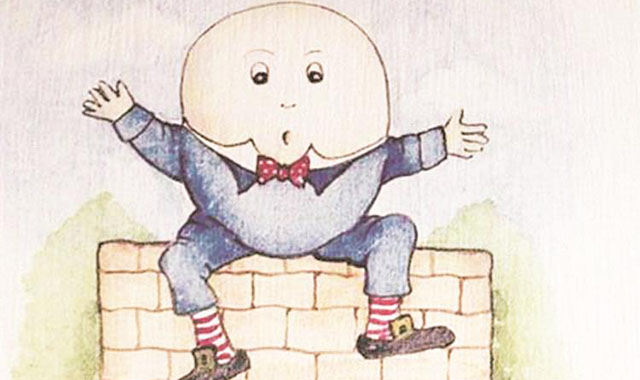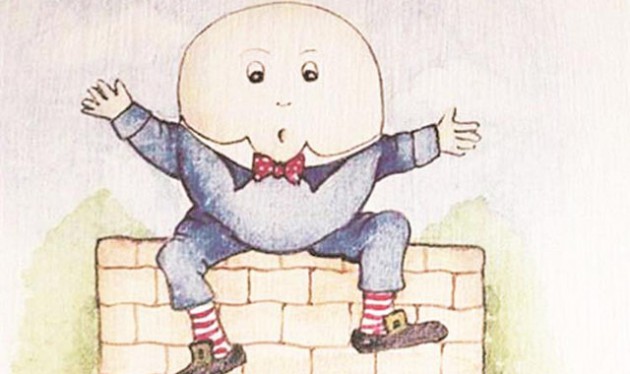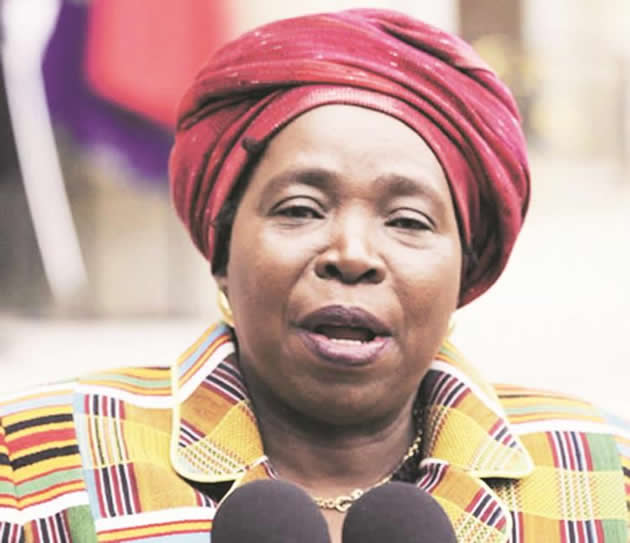Bring indigenous rhymes into school curriculum


Humpty Dumpty is the character in a popular nursery rhyme of the same name
Dr Sekai Nzenza on Wednesday
There are some nursery rhymes that cannot be translated. Doing so would spoil the meaning of the rhyme and dilute the knowledge within it.
“HI Dad, please urgently send me a Shona nursery rhyme, because it’s needed for a multicultural school project. Don’t forget to translate it,” wrote my cousin Reuben’s 12-year-old son, who is based in Australia. The message arrived late at night when we were all sitting around the fire in the village with our neighbours.
My brother Sidney was there too, sitting next to my cousin Piri. On the bench were myself, Jemba, Bokina the fencer and former trainee priest, and several other local guys who sat on the floor or on chairs. Outside it was very cold, because we are in June.
Once in a while, Reuben feels generous and buys commercial beer containers called Scuds or Tsviriyo. The beer is very cheap. Five litres cost only one dollar. Almost every day, you will find beer at our local shops. This beer sells much quicker than any other product.
“My son sent this WhatsApp message five hours ago but the network here is so bad. I am only getting it now. So, guys, I need a Shona nursery rhyme for my son,” said Reuben.
Jemba then commanded us to remain quiet. He started his own nursery rhyme, as he remembered it from school:
Little Jack Horner
Sat in the corner,
Eating a Christmas pie;
He put in his thumb,
And pulled out a plum,
And said: “What a good boy am I!”
We all clapped hands. But Bokina did not. Instead, he stood up and jeered at Jemba, saying, how can he sing about a pie yet he had never seen one or even eaten one?
“But do we need to have seen a pie to sing about it?” asked Piri.
“We all sang about places and food we had never seen before.”
Bokina then stood up and started singing a familiar song from the book called “Animal Farm”. Sidney joined him and the two of them stood next to the row of plates on the clay shelf and sang the whole “Animal Farm” song to us. Surprisingly, they knew all the words. Freeborn, the recently converted Apostolic guy (who no longer drinks beer) grabbed a drum from behind the door and started playing to the tune. Even Piri hummed along, although she did not know what the song was about.
Beasts of England! Beasts of Ireland!
Beasts of land and sea and skies!
Hear the hoofbeats of tomorrow!
See the golden future rise! . . .
Sidney and Bokina ended up singing the last part slowly with arms on each other’s shoulders swinging along together saying:
Beasts of England, seize the prizes,
Wheat and barley, oats and hay,
Clover, beans and mangel wurzel
shall be ours upon that day!
When they finished, we said, amen!
“Imi, that is not a nursery rhyme mhani,” said Jemba, cigarette at the corner of his mouth. “That is a song from a book by George Orwell called ‘Animal Farm’.”
I said Jemba was right. Sidney said of course Jemba was right. But in primary school, any English song or nursery rhyme was taught in order to help village children to learn how to speak and sing in English.
Since I could still remember the days when I was a Girl Guide at St Columbus School, I asked for a turn to recite a nursery rhyme. Bokina, who had made himself the MC, gave permission. I therefore started singing “Mary had a little lamb.” But my memory failed me and I did not complete it. Jemba quickly came in with another one:
Baa, baa, black sheep,
Have you any wool?
Yes, sir, yes, sir,
Three bags full;
One for the master,
And one for the dame,
And one for the little boy
Who lives down the lane.
We all clapped hands giving Jemba a loud applause. Sidney proudly said he taught Jemba that rhyme, when he was a teacher at St Columbus School, just before the liberation war for independence started.
Sidney than said one of his favourite nursery rhymes was called “Ring Around the Rosie”. He taught the children to sing it and dance around in a circle until they all fall down, as part of the dance. At that time, Sidney said we did not know that this nursery rhyme was first introduced in 1881, a few years before Cecil John Rhodes and the Pioneer Column arrived here to swindle Lobengula by signing the infamous Rudd Concession treaty.
That treaty began the end of Lobengula and saw the British come in and name this country Rhodesia. Later on, when the British were truly settled and growing tobacco in places where we used to grow sorghum, some of us went to school and learnt how to sing “Ring Around the Rosie”.
We also did not know that this rhyme was actually two centuries old. Later on, we also learnt that “Ring Around the Rosie” refers to the 1665 Great Plague of London. At that time the “rosie” was the rash that covered those affected. Then the smell which they tried to cover up was called a “a pocket full of posies”.
The Great Plague killed nearly 15 percent of the people. This is why the rhyme ends with “Ashes! Ashes! We all fall down” meaning, we die. There was silence for a little while after Sidney’s story of the Great Plague.
“Your nursery rhymes are all fine and good. History is good too. But, you are not helping with my son’s homework. I said I needed a Shona nursery rhyme, not your English colonial ones. “What’s the use of talking about Little Jack Honer and Humpty Dumpty? Who cares about that?” asked Reuben, looking exasperated.
“Aiwa, Reuben,” said Sidney, putting on his school teacher’s voice.
“There was nothing wrong in learning about English nursery rhymes. It was all part of learning to speak English,” he said. Then there was a huge argument over our past colonial education system. If my grandmother, Mbuya VaMandirowesa, was around, she would have taken sides with Reuben. As if to close the argument, Piri began singing her own version of nursery rhyme called “Mwanangu Chiramwiwa …”
We all stood up and with the drum playing in the background, we danced to one of the oldest songs:
Mwanangu Chiramwiwa. Endawo, endawo kumagaka. Tizope waNyamande. Vane me, vane meso machena. Ane, anenge engururu. Ngururu, nguru dzachijaka, chijaka, anongojakaira…
Maybe this was not a nursery rhyme, but certainly a memorable childhood song from our past traditional life. Reuben took his iPad and asked if Sidney could translate “Mwanangu Chiramwiwa” into Shona. We all said that would be too difficult.
Then each one of us started giving Reuben suggestions. We said, how about, kwedu kune nyimo hakuna mandere, or kana ndikadai kana ndikadai zvoshamisa, or sipoti sipoti zinyangarinyanga, ndinotsvaga wangu, zinyangarinyanga. But after all the attempts, none of us could translate the nursery rhymes we remembered from our childhood. We gave up trying.
There are some nursery rhymes that cannot be translated. Doing so would spoil the meaning of the rhyme and dilute the knowledge within it. Sidney said this is why children must learn to be bilingual, the way other nationalities like the Indians, Chinese, French, Germans and others do.
“Isu chete tisu tinosvora rurimi rwaamai, nekuti tiri madofo,” said Bokina, meaning we Zimbabweans are the only ones who despise our mother tongue in favour of English only because we are fools.
“Sure, maybe, but we can still recover from that foolishness. We could start by translating a real Shona rhyme into English please, right now, for my son’s home work.”
Piri then stared another memorable song called “Shiri Yakanaka Unoendepi?”
We remembered it and sang along with her. This one was easy to translate:
“Beautiful bird, where are you going?
“I am going to the clouds
“So I can look like (or be the same?) as clouds?”
Reuben wrote the translated words and sent them to his son. “This is great. Thanks guys. I am reminded of the past when we used to be active children playing outside. Back in Australia, I tell my wife, what is to be gained when our children spend hours and hours staring at cartoons on television while eating junk food?
“My wife and I fight over this all the time. I tell her, listen Mai Tinashe, when we were children, we played active games, we learnt how to be boys, climbed trees, swam in rivers, went hunting, worked in the fields. During the dry season we danced in the moonlight. Our brains were active and so were our bodies. But look at me now,” Reuben said, pointing to his bulging belly.
“So you think dancing to old nursery rhymes will stop the overeating and over-drinking that you do?” asked Piri.
Reuben was not offended. Instead, he said the old indigenous nursery rhymes must be brought back to the school curriculum because there is so much more to learn from our past nursery rhymes.
Dr Sekai Nzenza is a writer and cultural critic.









Comments